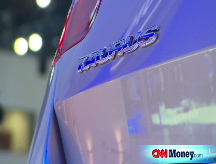Uncle Sam wants you to buy a car
A few plans floating through Capitol Hill are trying to get consumers back in the driver's seat.
 |
| 2002 Ford Excursion: A bill in Congress would offer consumers cash incentives to trade in older vehicles for newer, more efficient ones. |
NEW YORK (CNNMoney.com) -- With auto sales at crisis levels, Washington is trying to figure out how to get Americans buying cars again.
Several ideas are on the table, but two of them are really making the industry pay attention. One plan is to make new car costs tax deductible. The other is to give rebates to Americans with old cars so they can better afford to buy new ones, a program otherwise known as "cash for clunkers."
It would be an "above the line" deduction, meaning even tax filers who don't itemize deductions could still get the benefit, according to the bill introduced by Sen. Barbara Mikulski, D-Md., and Rep. Bill Pascrell, D.-N.J.
Auto loans of up to $49,500 would qualify. Car buyers borrowing more would still be able to deduct the interest and sales tax for the first $49,500. The benefit wouldn't apply to individuals making more than $150,000 or families making more than $250,000.
The deductions would save a car buyer about $1,300 on the purchase of a $25,000 car, according to a statement by Pascrell's office.
The second plan is more politely known as "fleet modernization." It combines economic as well as environmental goals in one package.
Under a bill introduced by Sen. Dianne Feinstein, D.-Calif., owners of older cars would get vouchers worth thousands of dollars toward the purchase of newer, more fuel-efficient vehicle.
To qualify for a voucher, a car buyer would have to trade in a vehicle with EPA-rated fuel economy lower than 18 miles per gallon. The vehicle being purchased would have to exceed, by at least 25%, certain mileage standards set by the Department of Transportation. Those standards would vary by the type of vehicle and model year. Vouchers for smaller amounts could be used to purchase a used car or consumers could get public transit credits.
For the customer to get that cash, the car dealer would have to certify that the trade-in was getting scrapped and not resold. The car's vehicle identification number (VIN) would be tracked to make sure it never shows up on a vehicle registration again.
Crushing the old car has two benefits. First, it ensures that the consumer's purchase of a more efficient vehicle actually has a net environmental benefit. Second, it prevents a glut of used cars on the market, which would reduce trade-in values for new car buyers, which would cut into the sales incentive effect.
In addition to boosting car sales, the plan could save an estimated 80,000 barrels of oil a day, a spokesman for Feinstein's office said. Because it holds appeal for both environmentalists and the auto industry, the cash-for-clunkers idea seems to be generating the most discussion.
"The 'money for clunkers' may be a good idea, period," said Michael Smitka, a professor of economics at Washington and Lee University in Virginia, who focuses on the automotive industry. But it's a good idea more for its environmental benefits than for its economic effect, he said.
Smitka generally doesn't support the idea of short-term incentives to boost sales, because he believes the industry needs to find its way through the crisis on its own. Short-term incentives make long-term planning difficult because they obscure the natural, underlying vehicle demand, he said.
Once the crisis is over, he believes that taking these incentives away could cause another disruption. "It could cost an awful lot of money for gains that come back and bite you when the policies are taken off," he said.
But others say the measures need to be temporary to be effective. If not, consumers will simply decide to postpone the purchase anyway, knowing that the incentives will be just as good when the economy improves.
In the short term, said David Regan, the National Association of Automobile Dealers' vice president for legislative affairs, measures like tax deductions and cash for clunkers could lessen the pain for the nation's entire economy.
"We believe, if it's targeted, it will create some marginal increases in sales," he said, "and that's exactly what we need right now."
Several people representing major automakers in Washington, D.C., all of whom spoke on the condition that they and their employers not be named, also said they strongly supported both plans.
With car sales accounting for about 20% of the value of all retail sales in America, Regan said, boosting car sales will have a bigger economic impact than incentivizing sales of other products.
"We believe the revival will have to come through the showrooms," he said.
By the end of last year, car sales had fallen 36% year over year. Meanwhile, about 900 auto dealers closed their doors during the year, according to published estimates by NADA.
With carmakers' own incentive programs clearly not doing enough, and the carmakers themselves strapped for cash, some sort of help at the retail level will be critical, said Jesse Toprak, an auto sales analyst with the automotive Web site Edmunds.com.
Toprak said he would rather see a program that makes it easier for customers to actually get loans, not just provide extra cash or make interest on loans deductible for those who can get them. Right now, he said, auto loans are just too hard to get to begin with.
He suggests a program under which the government would, essentially, provide insurance for auto loans. That would remove some of the risk for auto lenders and might get the auto loan markets going again.
"What we can do to get them out shopping is to enable consumers with average credit to get financing," he said. ![]()


